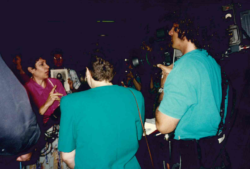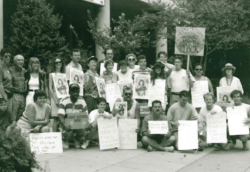Hire Deaf Talent, Stop Misappropriation!
Media is one of the most powerful tools to advance social change. Movies and television shows have been instrumental in transforming society. Every civil rights movement in the U.S. has been able to use the power of media to change perceptions and promote equality. Movies like Selma and Hidden Figures have exposed historical omissions that must be corrected. The increase of roles showcasing individuals who are LGBTQ have led to more acceptance and pride within society. These examples demonstrate the power to influence people as to how a group is viewed, even as it is increasingly necessary to expand beyond single identity movements towards a comprehensive multiple identity lens. However, to achieve equality, the narrative about any group must come from the group itself. The power of a story lies not only in how the story is told but also how it is portrayed.
Too often, hearing people misappropriate our stories and our roles, only to seek out our assistance to help them create a facsimile of our lives. This is not authenticity.
We cannot have any more misappropriation of deaf and hard of hearing characters on stage, screen, and television. Deaf and hard of hearing people are actors, writers, directors, producers, cinematographers, photographers, designers, artists, and more. Despite all of this talent, deaf and hard of hearing people are not getting hired enough, including deaf and hard of hearing people of color. These industries’ general tendency to exclude people of color has had a compounded impact on deaf talent from marginalized communities, and this must also be addressed.
One listing highlights deaf and hard of hearing talent (#DeafTalent) and thank those who cast them in U.S. full-feature movies shown in theaters. This listing does not include documentaries, short films, internet-streamed videos, made for television movies, or television shows. The goal of these listings is to hold accountable actors who misappropriate roles of deaf characters, and the directors who choose those hearing actors instead of casting authentic deaf and hard of hearing actors.
The listings were created through research of various movie databases, primarily the Internet Movie Database (www.imdb.com), and is not comprehensive. Public feedback is welcome to help ensure that the listing contains every movie that has cast a deaf or hard of hearing actor. While casting of hearing people as deaf characters has occurred since movies began, our listing of misappropriated roles begins with the 1993 release of Calendar Girls, which was the first movie that the Deaf Community protested across the country at the time for misappropriation.


Left photo: Linda Bove talks to media about the protests against Calendar Girl in 1993. Right photo: Calendar Girl protest in 1993.
Every director and actor needs to realize the importance of authenticity by casting deaf and hard of hearing talent to portray stories of and about our community. Further, these listings serve as notice to all directors and actors that we will not allow misappropriation to continue unaddressed but will bring as much attention as possible to every such instance.
Helpful links:
- #DeafTalent, #POCDeafTalent, #DeafBlackFilm, #DeafTalentOfColor and #BlackDeafTalent originated by Jade Bryan
- #LatinxDeafTalent originated by Roberto Sandoval
- #DeafBlindTalent, #DeafQueerTalent, #DeafTransTalent original tweet by Tommy Korn
- Support the #POCDeafTalent Movement
- When it comes to depicting disability, Hollywood keeps ‘cripping up’
- An example of optimal casting practice
- Deaf Talent Now
- #DeafTalent – Deaf Roles Belong to Deaf Actors
- Deaf Talent, Seen and Heard
- Deaf Talent Directory
- Washington Post Story on 1993 Calendar Girl Protests
- Tulsa World Story on 1993 Calendar Girl Protests
- Disability Movies Aren’t What They Used to Be, That’s Good
